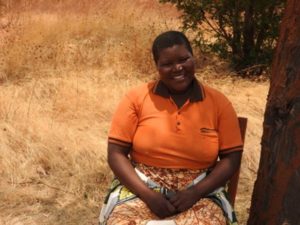
Anita Mfilinge is a farmer in Kinywang’anga village, in Iringa Rural District. When her father died several years ago, Anita and her six siblings inherited the family land, but in accordance with local custom, the boys inherited bigger parcels than the girls.
Before the Feed the Future Tanzania Land Tenure Assistance (LTA) project reached her village, Anita thought that for a woman to own land was a privilege, not a right. She believed a woman’s land rights were dependent on her father, husband, brothers, or sons. Anita learned the truth about women’s land rights during LTA’s training on women’s land registration, which informed women about their rights under the law, and how they could gain secure land tenure through LTA’s activities. “I am very grateful that I now understand that women’s land rights are fundamental human rights, and that everyone has the right to own land alone as well as in association with others.”
Inspired, Anita discussed with her husband the various types of land tenure. They chose joint tenancy, in which they both would register their names and have equal ownership of their eight farm parcels and one residential plot. Joint occupancy is a good option for couples as it protects the woman’s rights if her husband dies.
Anita is not alone. Most women interviewed in Kinywang’anga village said that they were not aware of their rights to land. Most women had less information and understanding than men about land-related laws and how to get secure access to land. LTA seeks to change this, while assisting district and village authorities to complete land use planning and issue certificates of customary right of occupancy (CCROs) in 41 villages in Iringa and Mbeya Districts. Secure property rights are vital as they reduce women’s dependence on male partners, facilitate land transactions, protect women’s rights to land, ensure efficient and sustainable resource use, improve the business climate, and promote investment.
LTA’s first activities were in Kinywang’anga Village, where the project has successfully completed mapping and registering land claims for 838 parcels. A total of 359 villagers registered land claims, 55 percent of who were women. Interestingly, 68 percent of these women claimants chose single occupancy, meaning that they are the sole owner of their land whether they are married, single, or widowed. Following District Land Office processing, these claimants will soon receive their CCRO.
LTA will collaborate with and build districts’ capacity to develop a comprehensive system for community-based, low-cost, large scale first registration/regularization of land tenure that will be replicable, scalable and sustainable for future implementation by the Tanzanian Ministry of Lands. The activity will support district and village authorities to complete village land use management plans and issue 50,000 CCROs in 41 villages in Iringa Rural and Mbeya Districts. It is envisioned that such large scale issuance of CCROs in rural villages will reduce land tenure-related risks and lay the groundwork for sustainable agricultural investment for women and men smallholders and commercial investors particularly in the Southern Agricultural Growth Corridor of Tanzania (SAGCOT), as well as Feed the Future focus value chains.

